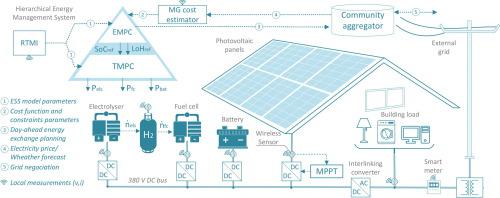Applied Energy ( IF 10.1 ) Pub Date : 2021-01-12 , DOI: 10.1016/j.apenergy.2020.116420 Daniela Yassuda Yamashita , Ionel Vechiu , Jean-Paul Gaubert

|
Hybrid energy storage systems have been increasingly envisaged for building microgrids to soften the drawbacks arising from the unpredictability of renewable energy resources and dwelling occupancy. The combination of long- and short-term energy storage systems can enhance the building microgrid capacity of shifting the demand peak toward periods of power generation, increasing the marks of self-consumption rate. However, the design of energy management systems for hybrid energy storage microgrids is more complex than single ones due to a greater number possible solutions. Faced with this issue, this paper proposes a two-level Hierarchical Model Predictive Controller (HMPC) enhanced by two data-driven modules to improve the performance of building microgrids equipped with hybrid energy storage continuously and automatically. With minimum pre-design steps, the two data-driven algorithms improve the accuracy of Li-ion batteries and hydrogen storage models and determine adequate parameters for the HMPC cost function. Relying predominantly on data measurements, the proposed hierarchical controller determines which energy storage device must be run on a daily basis based on the estimation of the annual self-consumption rate and the annual microgrid operation costs. This real-time analysis decreases microgrid expenditure because it avoids grid penalisation regarding the energy autonomy index and reduces the degradation and maintenance of energy storage devices. Compared to a standard rule-based strategy, the proposed controller reduces annual costs up to 5% in residential buildings and 9% in non-residential ones. In contrast, compared to a conventional HMPC the annual expenditure is reduced from 1% to 7% in both types of buildings.
中文翻译:

具有优化成本函数的两级分层模型预测控制,用于建筑微电网中的能源管理
越来越多地考虑使用混合储能系统来建造微电网,以减轻可再生能源的不可预测性和居住所带来的弊端。长期和短期储能系统的组合可以增强建筑物的微电网容量,从而将需求高峰转移到发电时段,从而增加自耗率。但是,由于有更多可能的解决方案,因此用于混合式储能微电网的能源管理系统的设计比单个微电网更复杂。面对这一问题,本文提出了一种由两个数据驱动模块增强的两级层次模型预测控制器(HMPC),以连续,自动地提高配备了混合储能的微电网的性能。通过最少的预设计步骤,这两种数据驱动算法提高了锂离子电池和储氢模型的准确性,并确定了HMPC成本函数的适当参数。所提出的分级控制器主要依靠数据测量,基于对年度自耗率和年度微电网运行成本的估算,确定必须每天运行哪个储能设备。这种实时分析减少了微电网的支出,因为它避免了能源自给指数对电网的不利影响,并减少了储能设备的降级和维护。与基于规则的标准策略相比,拟议中的控制者将住宅建筑的年成本降低了5%,将非住宅建筑的年成本降低了9%。相反,











































 京公网安备 11010802027423号
京公网安备 11010802027423号